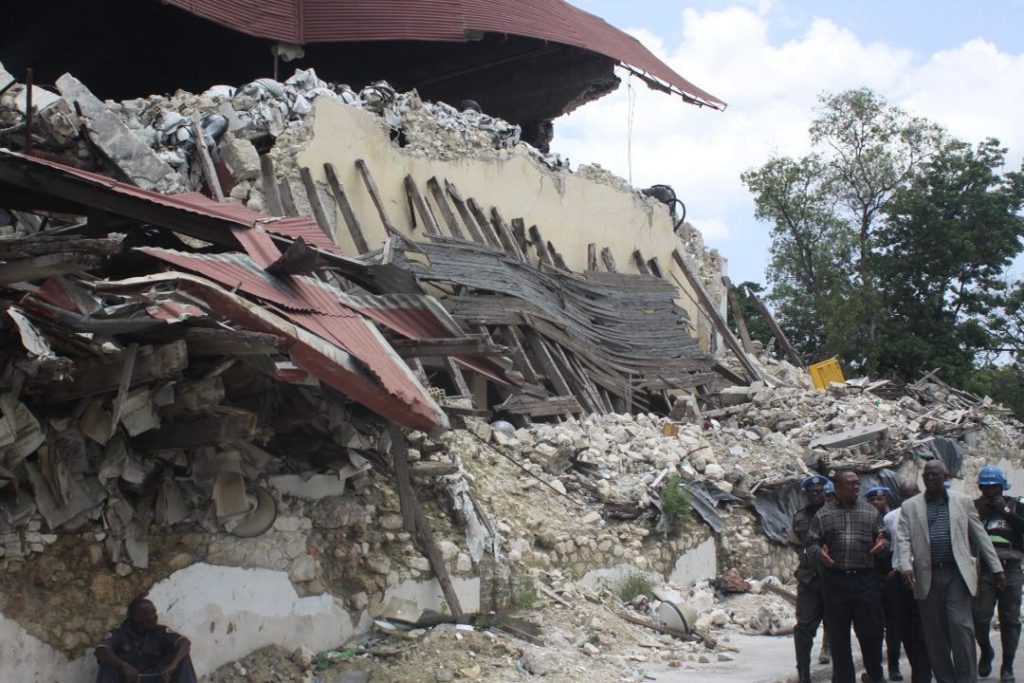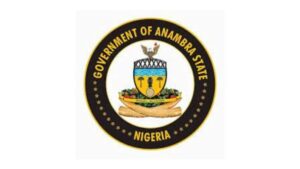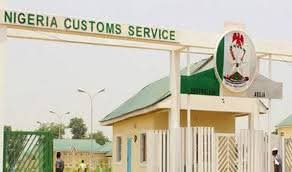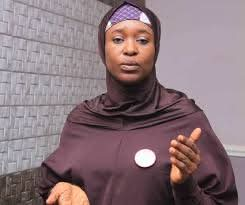HAITI AND THE CRUELTY OF NATURE

Valentine Obienyem
On the 12th of January, 2010, the world media was awash with the story of another brutality of nature. The poorest country in the Western Hemisphere, which has had a chequered history, Haiti, was struck by earthquake, leaving in its wake sorrow, blood and tears.
The news talked about hundreds of thousands of people that were homeless, missing, maimed or dead. The news also tried to unravel the past of Haiti. The country has for so long been ravaged by all manner of natural disasters.
Haiti has a thriving belief in voodoo. I do not know what they attributed as the cause of the earthquake; perhaps an angry god that carries the earth shrugged its shoulder. Perhaps a god somewhere was angry that the people do not propitiate it again. Who knows! However, science has for long, after extensive study, shown that Haiti is susceptible at any time to major seismic activities. As a matter of fact, it has been struck frequently by cyclones, tsunamis, flooding, Hurricanes, tropical storms. In 2008, it was struck by Hurricane Gustav, Hanna and Ike causing nearly 800 deaths.
The earthquake brought Haiti to the forefront of human enquiry: what sort of country is it? Whence did they come and when? Where is it located? What about its political, economic and social development? Are they whites or blacks? These are necessary questions most serious enquirers asked at that time. These questions are necessary because history is a child of geography, politics and economics. The operations of land, sea, air, natural resources, the political temperament and prevailing economic order and their forms and products have great effect and shape on the history of a people. But I do not like dwelling on origins and things like that which I consider as part of the mysteries of existence about which we may come across but may never know.
Haiti is positioned between the Caribbean and the Atlantic Ocean. It is smaller than one state in the U.S.A. Rough and mountainous, with tropical climate of heat and unsoundly soil, it lies in the middle of hurricane belt and subject to severe storms from January to October. Speaking on Haiti, Jaures, the author of Histoire Socialiste attributed the mercantile prosperity of France from the capture or purchase of African slaves, their transport to America, and their sale there for work on the plantations. According to Jaures, in 1788 French slave dealers shipped 29,506 slaves to St. Dominique (Haiti) alone. He continued and said that French investors owned most of the soil and industries in the island.
With independence on 1 Jan, 1804, Haiti was the first independent nation in Latin America and the first black-led republic. We read the story of how they fought for their independence and how it was the only country in the Caribbean axis that was not submissive to the white masters. In trying to understand the history of their struggle for independence, some names such as that of Toussaint L’Ouverture, in whose memory they named their International Airport, kept reoccurring. In fact, history said that Toussaint it was who led a slave revolt that prompted the renowned Napoleon Bonaparte to send an expedition force of 20,000 to stop Toussaint and how the outbreak of yellow fever decimated his force. The Commander of the French forces, Charles Leclerc was said to have invited L’Ouverture to a parley, kidnapped and sent him to France. Imprisoned in Tort de Joux, he died in 1803 of exposure to tuberculosis and malnutrition: so old are the cruelties of war! The political history of Haiti is also full of names such as Jean-Jacques Dessalines, Dr. Francois Duvalier (Papa Doc) and his son, Jean-Claude Duvalier (Baby Doc) and Rev. Fr. Jean Bertrand Aristide. Jean is perhaps the commonest name in the State.
During the Nigerian/Biafran war, Haiti was among the countries that recognized Biafra. We do not know what form of recognition and we cannot seek that in this write-up. What is of interest is the concern shown by the world to Haiti’s problem – earthquake. Though Nigeria has extended aid, but the Nigerian Red Cross found it expedient for more assistance to the country. In fact, overwhelmed by Governor Obi’s assistance to Anambra State Red Cross by building a brand new office for them and the donation of two ambulances, the President of that organization, Owelle Rochas Okorocha named him the Red Cross Goodwill Ambassador to Haiti.
Part of the Governor’s duty as spelt to him by the Red Cross as their goodwill Ambassador to Haiti was to lead the delegation of Red Cross to the country to assess the level of damage. When the idea was first mooted, a lot of people signified interest to be part of the trip. Very soon, tales of how difficult life is in Haiti started to emerge. In his customary practice, the Governor books his own hotel whenever he is travelling through the INTERNET. It was incredible to him when he could not get any single hotel through the net. He made calls but the feedback was discouraging: “there is no hotel in Haiti”, at least not the type that could be booked on line. As if those jostling for the trip got this information, one by one, all of them declined to be part of the trip. The Governor who saw it as part of contributions to humanity was not daunted. In fact, he said he was heading to Haiti even if it meant sleeping in a net as Bill Clinton and George Bush did when they visited.
It was a long trip From Nigeria to Haiti. Accustomed to action, Obi bore the tedium calmly. First we landed at Florida, USA before connecting American Airline to the place, which is about an hour from Florida. As a sign that all is not well, the clear state of insecurity was written on our tickets for us to be careful. The Airport was damaged by the quake, part of the immigration check was a warehouse converted for the purpose. As we were checked, what crossed my mind was the fact that even Haiti conduct thorough immigration check to regulate people coming into their country, when it was clear to everybody that nobody will willingly go to the country. Perhaps checking was one of the expressions of sovereignty.
We spent quite sometime transversing the length and breadth of Haiti. It is simply the story of human misery and the cruelty of nature. Ordinarily, Haiti was already on the ground only to be visited by a destructive earthquake. Going round the city suggests that the earthquake affected all the buildings because even those still standing are with one form of crack or the other.
We visited the damaged Presidential Palace, the Supreme Court Building that killed all the Justices and judicial workers in the place when the earth shrugged its shoulders. We visited the ruins of the Ministry of Foreign Affairs, Interiors, Finance, Works and External Affairs. All the land, air and sea transport facilities and communication system in the country were destroyed. St. Michael District Hospital, the largest referral Hospital in South East Haiti also collapsed. Over 4000 Prisoners escaped from different prisons. We visited the damaged diplomatic quarters and many other buildings, public and private, that were affected by the quake. The dead were buried in mass graves that one Vodoo priest, Max Beavour, had to protest lack of dignity accorded the dead.
Though we saw tents falling apart and camps everywhere, but going by the number of buildings that went down or are uninhabitable, the Governor wanted to know where the inhabitants were, especially when no transitional houses have been built. Thus we were taken to camps that are as big as villages some of which do not have electricity, running water or sewage disposal. Inside these camps we saw teenagers that should be in School, all pregnant. Since January, schools have remained closed in the city. In fact, the Haitian Minister of Education, Joel Jean Pierre stated that education had “totally collapsed.” We heard tales of rape, brigandage and lawlessness that appear to be an atavistic throwback to the Hobbesian State of Nature.
While in Haiti, I was particularly brought to tears when about 30 children in the Street swarm round one of us who bought some biscuits on the road side for a bite of the essential commodity. On enquiry, one was told that most of them do not know their parents. Nigerian Police that provided security for us told us disgusting news about their experiences. Hear one of the Police men: “It is better now. When we came, soon after the quake, acrid smell of bodies hung on the air.”
One thing I observed is that the people of Haiti love the arts and practice it with abandon. In the midst of this ruin, one sees art work everywhere. Their artists love nature and delight to represent the liveliest animals, grand fish, the most delicate flowers, and the most graceful plants. One’s feeling in the presence of some of their pictures was one of affirmative response: this is art in grand style.
What was decipherable from the trip to Haiti is that Haitians are overwhelmed by the quake and they appear to be confused right now. Even the debris from the quake have not been cleared after over seven months. I understand that most of the pledges for assistance to Haiti have not been redeemed. This is where I understand the need for what the Nigerian Red Cross is doing in Haiti. Clearly the country will not survive if abandoned by the world. In fact, just as I argue that we should bring back the whites to run our affairs in Nigeria for sanity, I told one of our colleagues that the people of Haiti should just beg the USA to take them over as the 51st State.
Haitians are distressed. Haitians are confused. Haiti is in need of human compassion. What the Nigerian Red Cross is doing is worthy of support. The International community needs to do more for the country to avert future monumental human tragedy.
Mr. Obienyem sent this piece from Awka






